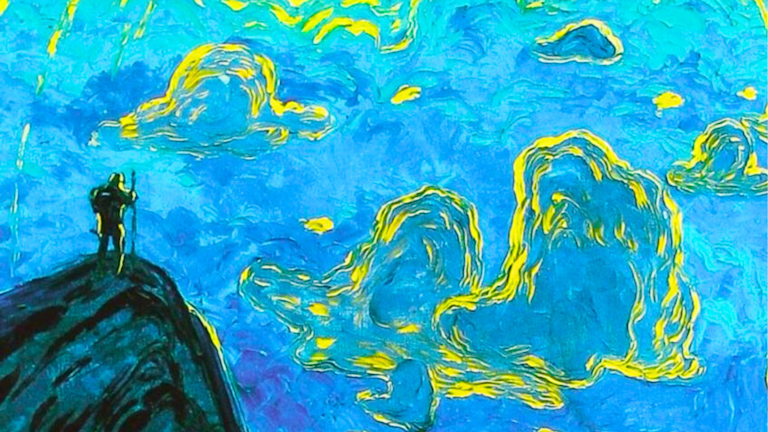May 31, 2024
After highschool, I worked on a farm for a time as I considered the next step. Something was missing in my life. I felt empty. My previous way of life, seeking autonomous freedom, felt empty and void. But I was still seeking for a meaning, a truth, a reality, apart from God.
On my coffee breaks, I would read a psychology textbook I pulled from my parent’s book shelf. I was seeking for a deeper insight into my human condition. But I was not yet ready to read about the Christian faith.
It reminds me of what I once observed in a bookstore in Dortmund. I was in the religion and spirituality section. There were three young women exploring the resources available on modern spirituality and witchcraft.
As a joke, one grabbed a Bible from the nearby shelf and shoved it in the face of her friend, saying, “This is what you need!” They laughed and quickly put it back on the shelf. Unfortunately, Christianity and the Bible carry a lot of baggage in the West. It is viewed as an outdated and antiquated resource for spiritual meaning and purpose.

Jesus and the scriptures, too, were not the first place I turned to in my search. However, how I was searching for a purpose was also not filling the void. The books on modern psychology and modern sociology were interesting, even helpful for some level of self-understanding, but I needed something stronger and outside the human to save me from my spiritual condition.
Broken Cisterns
In the Gospel of John, there is the story of an encounter between Jesus and a Samaritan woman. Jesus crosses the border to Samaria and breaks cultural taboos, speaking to someone who was not only a Samaritan, but also a woman. He asks for water. Then he offers her “living water,” addressing the deeper thirst all people have for God (John 4:13-14).
It is possible that the author of the Gospel had Jeremiah in mind, addressing Israel’s constant temptation to deny the living God: “... for my people have committed two evils: they have forsaken me, the fountain of living waters, and hewed out cisterns for themselves, broken cisterns that can hold no water” (Jeremiah 2:13).
Jeremiah’s concern was that Israel continually sought to quench their thirst for fulfilment through grasping at security, power and autonomy; broken vessels that cannot hold water. They turned to the nations and their gods around them to satisfy their thirst, a thirst meant to be quenched by God alone. It was a question of worship. They believed that the gods of the nations were better saviors than the living God, who created them and redeemed them from slavery.
This is another picture of our attempt to complete our nature through mediums other than God. I tried to dig a cistern that could hold no water. I was dying of thirst and did not realize it. I sought to quench my thirst for affirmation, recognition, status, indeed, for meaning itself, with things that could not ultimately satisfy.
Forced Solitude
In the wilderness of solitude, one is confronted with oneself. In the early medieval period, men and women alike began to retreat into solitude to seek God and their redemption. It was their way of retreating from the perceived corruptions of society, even of the newly founded Christendom after Constantine, in a thirst for something authentic, a genuine encounter and union with God.
However, in my situation, this solitude was not something I intentionally sought, but was the consequence of a lack of purpose. Reaching a point of self-awareness, realising that nothing was quenching my thirst for meaning, brought me to a crossroads.
Nietzsche would say that this is where, if I had the strength of will, a real new beginning could have started for me. It is interesting that in Thus Spoke Zarathustra, the first character that Zarathustra encounters is a monk, "But when he came into the forest, all at once there stood before him an old man who had left his holy cottage to look for roots in the woods" (Thus Sprach Zarathustra, 122). The monk had left civilisation to love and praise of God.
However, the way of Zarathustra is a kind of new monasticism with the intention of redeeming oneself from deceit of the myth of Christianity. After leaving the monk behind, spoke Zarathustra in his heart, "Could it be possible? This old saint in the forest has not yet heard anything of this, that God is dead!" (Thus Spoke Zarathustra, 124).

I could have, perhaps, not only overcome the dragon of my Christian, conservative background, but also directly faced my resentment and feelings of revenge and overcome them by creating something new–in myself, for myself. I could have transformed the self-imposed tragedy I was living into something new, creative, if I had the will, intelligence, and strength for such a venture.
But I was not, and am not, “overman,” but “merely human.” I realised that my life was leading to “nothing.” I was like the biblical prodigal son. Like him, I began to come to my senses. I saw my utter emptiness, my lack of any direction in life. Solitude, silence, reading books in my parent's small library; these things became a kind of awakening.
Perhaps I was just growing up. Or, perhaps, something deeper was shifting inside of me.
Divine Discipline
The exile of Israel and Judah was a terrible experience. In order to discipline them, so that they might receive the true living water, God brought them almost to the brink of destruction.
The prophets warned them. The prophet Jeremiah actually lived through the destruction of Jerusalem and the beginning of the Babylonian exile (Jeremiah 39-40). They were overcome by a stronger power, and brought to their knees. Their precious temple was destroyed and many of them were enslaved.
Perhaps this is what Dostoevsky was trying to convey in the story of Mitya, who needed the experience of prison to come to terms in the “underground," How would I be there underground without God? Rakitin's lying: if God is driven from the earth, we'll meet him in the underground! It's impossible for a convict to be without God, even more impossible than for a non-convict! And then from the depths of the earth, we, the men underground, will start singing a tragic hymn to God, in whom there is joy! Hail to God and his joy! I love him!" (The Brother Karamazov, 592).
Just as the people of Israel were given much warning and opportunity through the prophets to turn from their idolatry and injustice, so was I given much warning in my own life as well. The prophets used all kinds of flamboyant language to help the nation to see and perceive their spiritual condition, but they were continually rejected, even persecuted. Jeremiah himself was thrown in a well by his own people. While I did not do the same to the prophetic voices sent to me, I isolated myself from them.
Those who suffer, as I felt I was suffering in my forced solitude, find the question of God’s sovereignty to be a precarious one. The prophets made a direct correlation between Israel’s suffering under Babylon and their intentional straying toward evil. In my own life, I began to discern that the spiritual poverty I was experiencing was permitted by God, to awaken me to my need of redemption.
This does not mean that this is true of every difficulty; although some modern day prophets may insist that all suffering is permitted for this reason. I do not assume to be able to make this divine correlation in other situations without much discernment and consideration; who truly has the wisdom?
Spiritual Exile in the West
I had a conversation with a friend in Dortmund in a cafe where I sometime work. He is software developer with a Ph.D in Physics. He is also an agnostic, one who is not persuaded either way, if God exists.
However, he acknowledged that, at least in his native city of Dortmund, people seem lost, living in their own bubbles, with no seeming greater purpose or direction in their lives. He lamented this, seeing this as symptomatic of German culture, even Europe society as a whole.

We talked at length at what was needed. Interestingly, he admitted that perhaps Germans have it too easy and what is needed is a new situation of "challenge" to awaken them to a higher form of responsibility for their lives and society. In other words, a new form of exilic discipline?
When he asked me what I thought on this subject, so many ideas ran through my mind. But in the end, I could only point to our need for Jesus. In our Western cultures, as I did on a personal level, we have sought to dig cisterns that hold no water. Reason, science, and technology will not quench our deepest thirst. We are thirsting in a spiritual wasteland, having rejected the source of true living water.
In response, my friend and I recognised that we connected on a human level, both concerned for the moral and spiritual welfare of people in our city. We both agreed that the promise of the modern enlightenment has not progressed society in the way that many modern thinkers imagined. Some kind of deeper moral and spiritual awakening is needed to fill the void.
However, will we turn to Jesus, the only one who can quench our thirst in this spiritual exile?
Read Part 6: The Joy of Rebirth
Go to the series: A Transfiguration in Time
Sources
Dostoevsky, Fyodor. The Brothers Karamazov. Translated by Richard Paver and Larissa Volokhonksy. New York: Vintage, 1990.
Nietzsche, Friedrich. Thus Spoke Zarathustra. Translated by Walter Kaufmann in The Portable Nietzsche. New York: Penguin Books, 1982.
Suderman, Alex D. The Sacrament of Desire: The Poetics of Fyodor Dostoevsky and Friedrich Nietzsche in Critical Dialogue with Henri de Lubac. Eugene, OR: Pickwick Publications, 2022.

